WHAT ARE RUSSIA'S GOALS IN UKRAINE?
"To answer this question we must first consult the Substack of 17th century Ruthenian nobleman Bohdan Khmelnytsk...please don't interrupt me..."
“Two years into a war that’s reshaping the entire world, most Americans are not informed … Most Americans have no idea why Putin invaded Ukraine, or what his goals are now,” Tucker Carlson said in a video message explaining why he came to Moscow to interview Russian President Vladimir Putin.
Yes, Putin was finally given the opportunity to speak directly to uniformed Americans and explain the chronology that led to the launch of the SMO, as well as the goals and achievements of Russia’s military intervention in Ukraine.
Here’s what Putin said during his chat with Tucker on February 8:
Putin: Our goal is to stop this war. And we did not start this war in 2022. This is an attempt to stop it.
Tucker: Do you think you’ve stopped it now? I mean, have you achieved your aims?
Putin: No. We haven’t achieved our aims yet because one of them is denazification. This means the prohibition of all kinds of neo-Nazi movements.
Oh. What happened to the rest of the goals Putin spoke about when he announced the start of the SMO two years ago?
Let’s review Putin’s address on February 24, 2022, in which he laid out his case for Russia’s military intervention in Ukraine. I encourage you to read Putin’s statement and see for yourself what Moscow hoped to achieve with its special military operation.
I’ve taken the liberty of condensing Putin’s fiery address into five objectives for the SMO:
To halt NATO’s eastward expansion
To protect the people of Donbass
To “demilitarize and denazify” Ukraine
To ensure Ukraine does not become a “hostile anti-Russia”
BONUS GOAL: To demonstrate that Moscow will no longer tolerate Washington’s “empire of lies”
Feel free to nitpick but I think this list does a decent job of highlighting the main aims of the SMO as stated by Putin two years ago.
But if we accept that Putin listed multiple objectives when he announced the start of the SMO in February 2022, why did he only speak of denazification (the “prohibition of all kinds of neo-Nazi movements”) when Tucker asked him if Russia had “achieved [its] aims” in Ukraine?
Does Putin believe the other goals have already been achieved? Or perhaps for the sake of simplicity, Putin decided to use “denazification” as an umbrella term to encompass all the objectives he listed in February 2022? If this is the case, why did he define denazification as “the prohibition of all kinds of neo-Nazi movements”? Such a prohibition wouldn’t guarantee an end to NATO encroachment; nor would it guarantee lasting peace in Donbass. A ban on “neo-Nazi movements” would be a positive step towards preventing Ukraine from becoming a “hostile anti-Russia”, but rekindling friendly—or even just neutral—relations with Kiev would require much, much more. Maybe the goals of the SMO have changed?
To help answer these questions, let’s compare Putin’s motivations and goals for the SMO as stated in February 2022 to what he said almost two years later during his chat with Tucker. (All quotes from 2022 are taken from the Kremlin’s official English-language transcript of Putin’s address announcing the start of the SMO.)
Putin in February 2022: “Even now, with NATO’s eastward expansion the situation for Russia has been becoming worse and more dangerous by the year. Moreover, these past days NATO leadership has been blunt in its statements that they need to accelerate and step up efforts to bring the alliance’s infrastructure closer to Russia’s borders. In other words, they have been toughening their position. We cannot stay idle and passively observe these developments. This would be an absolutely irresponsible thing to do for us … In December 2021, we made yet another attempt to reach agreement with the United States and its allies on the principles of European security and NATO’s non-expansion. Our efforts were in vain. The United States has not changed its position. It does not believe it necessary to agree with Russia on a matter that is critical for us. The United States is pursuing its own objectives, while neglecting our interests.” (SMO goal: To halt NATO’s eastward expansion)
Almost two years have passed since Putin announced Russia could no longer “stay idle and passively observe” NATO encroachment and provocations. What has occurred since then?
In his interview with Carlson, Putin made no mention of Finland’s accession to NATO in April 2023. Sweden’s bid to join the alliance didn’t come up, either.
Mysteriously, there were also zero references to Steadfast Defender, the largest NATO exercise since the end of the Cold War, which includes drills on Russia’s border.
Instead, Putin repeatedly referred to how Washington reneged on its promise to halt NATO expansion:
The promise was that NATO would not expand eastward. But it happened five times. There were five waves of expansion. We tolerated all that. We were trying to persuade them. We were saying, please don’t. We are as bourgeois now as you are. We are a market economy and there is no Communist Party power. Let’s negotiate.
Please make a mental note because this chain of events (West makes promise to Moscow —> West deceives Moscow and reneges on promise —> Moscow calls for negotiations —> West doesn’t care and continues to do whatever it wants —> Putin complains to Tucker Carlson) is going to repeat itself again and again and again.
Take, for example, how Putin described the Minsk agreements to Tucker. Which brings us to our next SMO goal…
Putin in February 2022: “The purpose of this operation is to protect people who, for eight years now, have been facing humiliation and genocide perpetrated by the Kiev regime.” (SMO goal: To protect the people of Donbass)
Almost two years have passed since Putin announced Russia would take military action to protect people “facing humiliation and genocide” perpetrated by Gazprom’s pipeline partner. What’s the status on that?
Putin doesn’t say. (It’s not a secret, though. Keep reading and I’ll tell you.)
Instead, Russia’s president told Carlson that for eight years he did everything he could to reintegrate Donetsk and Lugansk into Ukraine, but his efforts were foiled by something completely unexpected…
We addressed the United States and European countries leadership to … implement the Minsk agreements. But frankly speaking, I didn't know how we were going to do this. But I was ready to implement [the Minsk agreements]. These agreements were complicated for Ukraine. They included lots of elements of autonomy for the Donbass territories. That’s true. However, I was absolutely confident—and I’m saying this to you now—I honestly believe that if we managed to convince the residents of Donbass—and we had to work hard to convince them to return to Ukrainian statehood—then gradually the wounds would start to heal. [I believed that] when these territories reintegrated themselves into a common social environment, when the pensions and social benefits were paid again, all the pieces would gradually fall into place. No, nobody wanted that. Everybody wanted to resolve the issue by military force only. […]
A year or a year and a half ago, former leaders of Germany and France said openly that they indeed signed the Minsk agreements, but they never intended to implement them, they simply led us by the nose.
… He was deceived by the West, again!
By the way: According to oligarch Viktor Medvedchuk (a close friend of the Russian president; Putin is godfather to Medvedchuk’s daughter), former Ukrainian president Petro Poroshenko begged Putin to “take” Donbass—but Putin refused, insisting that the breakaway republics belonged to Ukraine.
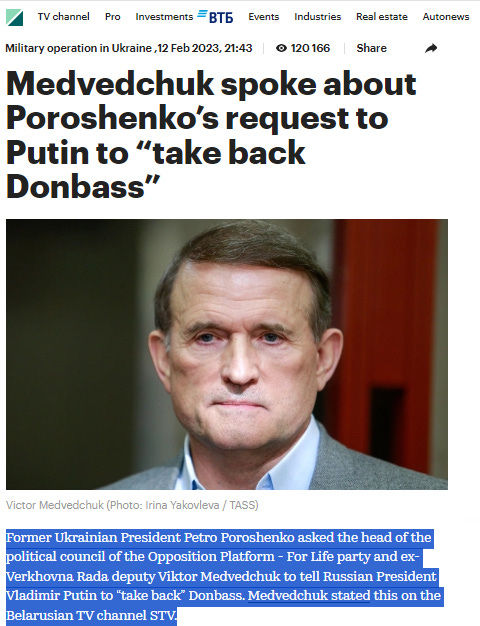
You probably didn’t read about it in Western Independent Media, but it was all over Russian media. Funny how that works.
Here’s what Viktor revealed a year ago in February 2023:
The host of [Belarusian TV channel STV] said that “there is information in the media” about a conversation during which Poroshenko “openly” told Putin to “take back Donbass.”
“I can tell you that Poroshenko repeatedly said in conversations with me: tell [Putin], let him take it,” Medvedchuk replied.
According to him, at the time that the conversation took place, Putin in an interview called Donbass part of Ukraine, while Poroshenko was trying to get rid of this region.“Because he [Poroshenko] understood that he did not need Donbass … When the President of the Russian Federation Vladimir Vladimirovich Putin said that Donbass was Ukraine, Poroshenko tried, as they say, to get rid of it,” Medvedchuk explained.
Why did Poroshenko beg Putin to “take” Donbass, and why did Russia’s president refuse this request even as Poroshenko’s government was “genociding” the region? These are very good questions that we will discuss in an upcoming blog post, Two Years of Not-War: Not Good.
But back to the Putin-Tucker interview.
Maybe Putin didn’t mention “protecting the people of Donbass” as an SMO goal because more people are being killed and maimed in Donetsk in a single day in 2024 than in the entire year of 2021?
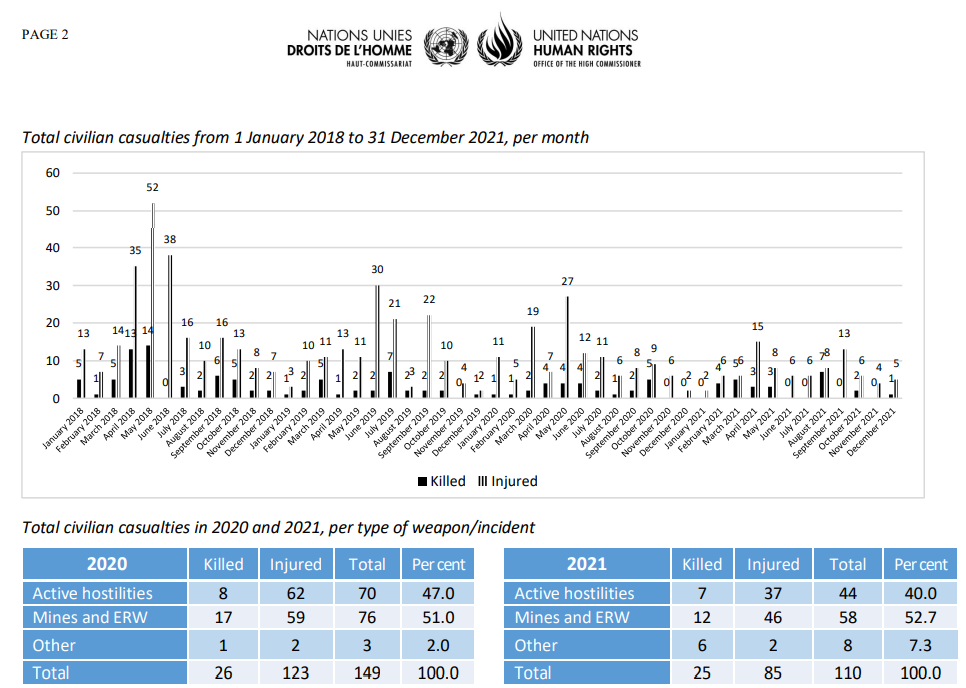
According to the United Nations, a total of 25 civilians were killed in Donbass in the year preceding the start of the SMO. At the end of January—almost two years after the start of Russia’s military intervention—27 people in Donetsk were killed in a single day by Ukrainian shelling.
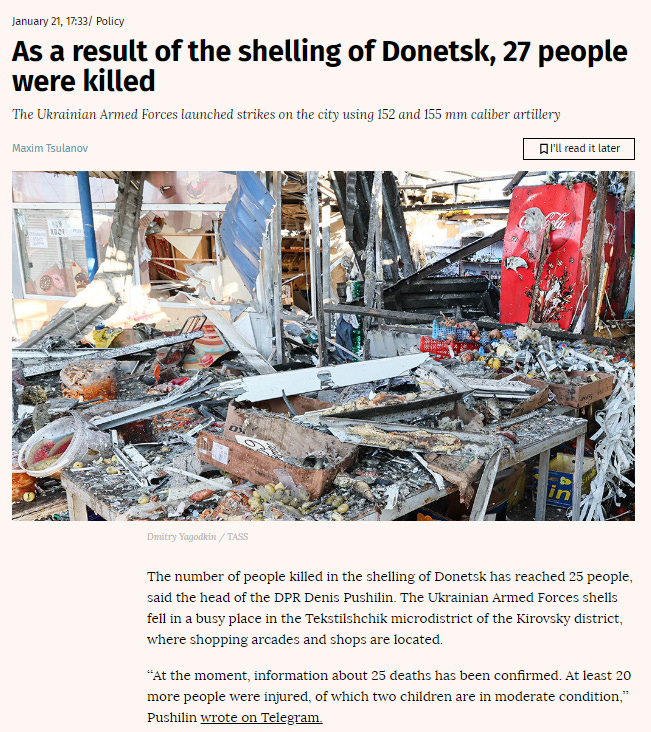
Even if the United Nations vastly underreported deaths in East Ukraine (for the sake of argument, let’s say 250 civilians were killed in 2021), there’s really no comparing the amount of bloodshed that we’re witnessing today. At the end of December, the Russian Ministry of Defense disclosed that more than 4,700 civilians had been killed within the territory of the Donetsk People’s Republic since the start of the SMO. And that’s just civilians killed in the DPR.
And Donetsk isn’t the only Russian city subjected to Ukrainian shelling—Belgorod is now being bombarded on a regular basis. I guess it makes sense that Putin wouldn’t want to bring this up, but if Tucker’s aim was to enlighten “uninformed Americans” about the goals and achievements of the SMO, maybe he should have asked Putin why after two years of war the Ukrainian military is still able to shell Russian territory with total impunity? Seems very topical to me.
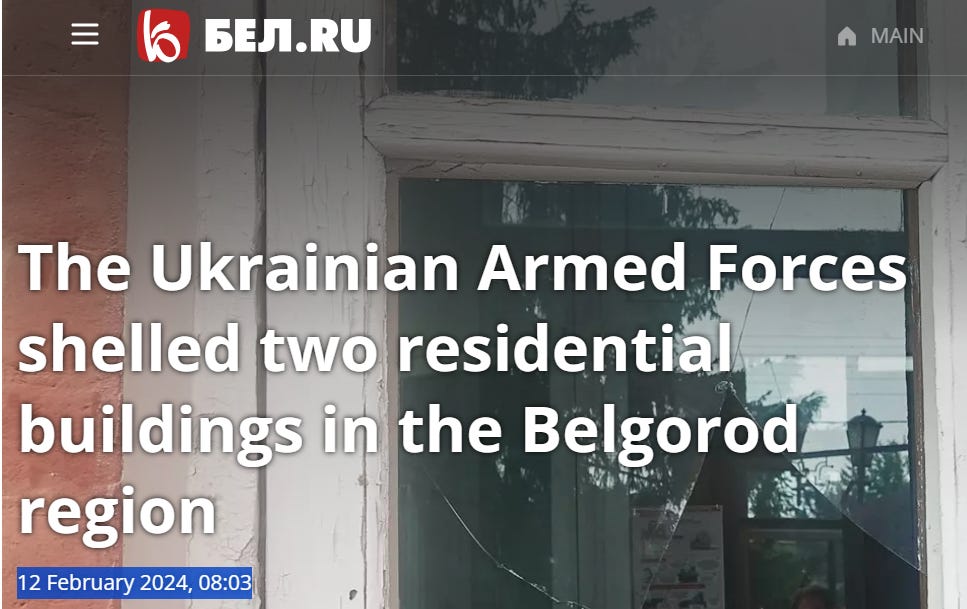
I HAVE A QUESTION: If Putin said in February 2022 that “the purpose of [the SMO] was to protect people who have been facing humiliation and genocide perpetrated by the Kiev regime”, but then two years later claimed Moscow “hadn’t achieved its aims [in Ukraine] yet because one of them was denazification”—WHAT KIND OF MESSAGE DOES THAT SEND IF DONETSK AND EVEN BELGOROD ARE BEING SHELLED BASICALLY EVERY SINGLE DAY? ANY IDEAS? ANY TAKERS?
Sorry for yelling. Let’s move on to “denazification”, the only SMO goal that Putin was willing to acknowledge during his chat with Carlson.
Putin in February 2022: “We will seek to demilitarize and denazify Ukraine, as well as bring to trial those who perpetrated numerous bloody crimes against civilians, including against citizens of the Russian Federation.” (SMO goal: To “demilitarize and denazify” Ukraine)
As we’ve already established, Putin told Tucker that Moscow hadn’t yet achieved its goals in Ukraine because “one of them is denazification.”
Putin probably brought this up because it allowed him to talk about his favorite subject: How the tricky West tricked him again!
A clause about “denazification” was purportedly included in a peace deal with Kiev drawn up in Istanbul in April 2022. You won’t believe what happened next! As Putin explained:
[W]e were told by the Europeans in particular that it was necessary to create conditions for the final signing of the documents. My counterparts in France and Germany said, “How can you imagine [Ukraine] signing a treaty with a gun to their heads? The troops should be pulled back from Kiev.”
I said, alright. We withdrew the troops from Kiev. As soon as we pulled back our troops from Kiev, our Ukrainian negotiators immediately threw all our agreements reached in Istanbul into the bin and got prepared for a long standing armed confrontation with the help of the United States and its satellites in Europe.
Just to recap: Putin sent tens of thousands of Russian troops into Ukraine to force the Nazis to the negotiating table. But when the Nazis were ready to sign a denazification deal, the duplicitous West asked Putin: “Hey, can you put your gun away? You’re making the Nazis nervous”—and of course Putin complied with this very reasonable request. And why wouldn’t he? As Putin told Tucker approximately 10,000 times, he was forced to launch the SMO because the West had deceived him for 20 years and he was sick and tired of their tricky lies, their slithery negotiating tactics, and their Nazism, and brute force was the only thing these weirdos understood.
You really have to wonder what was in the Istanbul agreement (which came about thanks to the diligence and diplomacy of Roman Abramovich, Russia’s most well-respected turbo-patriot), and why Putin felt comfortable voluntarily withdrawing Russian troops—apparently without any kind of collateral or insurance policy.

We may never know the contents of the Abramovich Peace Initiative, but according to Belarusian president Alexander Lukashenko, the deal involved Moscow “leasing” Crimea from Kiev. Yes, really. Lukashenko revealed this during an interview with Russia’s state-run Rossiya 1 TV in June. Here’s the writeup from Belarusian state media:
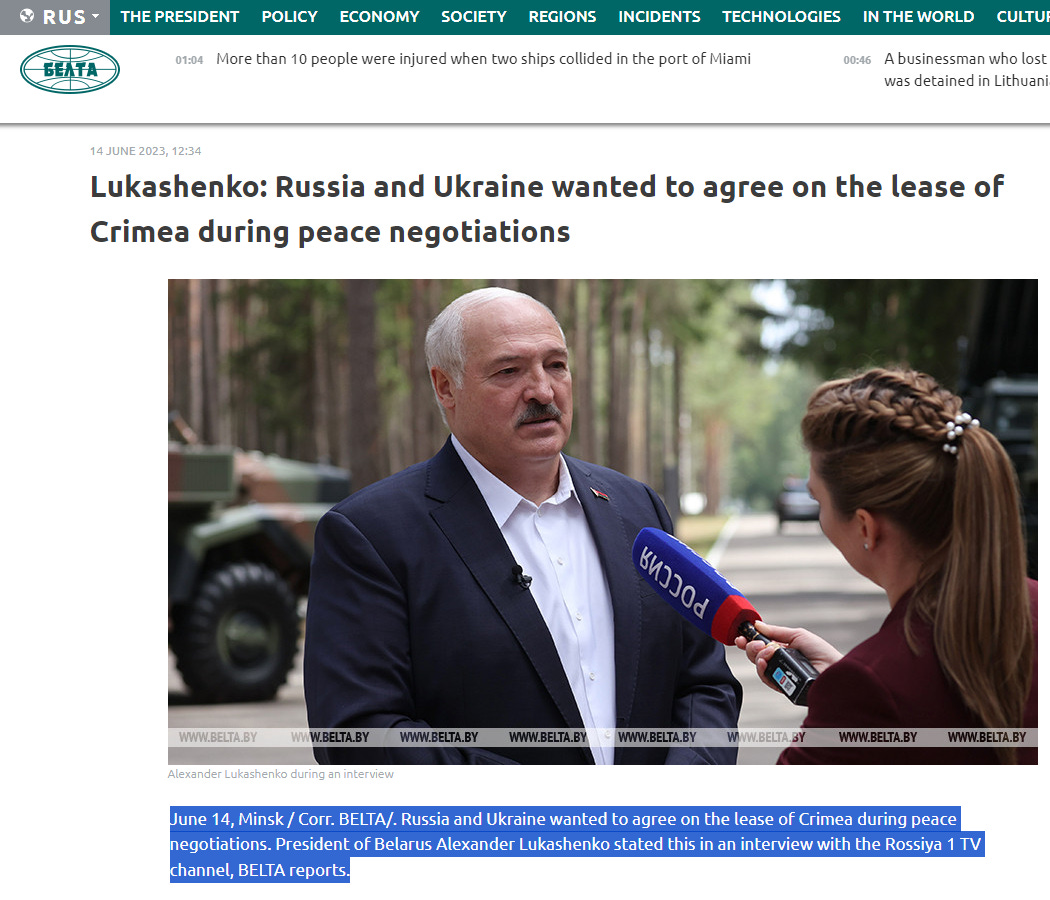
Just to be clear: Lukashenko wasn’t trying to rat Putin out for agreeing to a catastrophic, humiliating deal with Kiev. Oh no. Quite the opposite. He described the deal as a missed opportunity that was now impossible:
“Putin handed me a document that was initialed by the delegations. Normal, even in Crimea—there is some kind of long-term lease there, in Donbass, in the east... A normal agreement. If only this were possible now—but now it is no longer possible … It was a good process, but they abandoned it,” noted Lukashenko.
Basically everything Lukashenko said was later confirmed by Oleksiy Arestovych, Zelensky’s former advisor.
In an interview with Unherd last month, Arestovych claimed the terms of the deal were so favorable for Ukraine that Kiev’s delegation in Istanbul washed down some bubbly to celebrate:
Arestovych: I was a member of the Istanbul process, and it was the most profitable agreement we could have done. They concluded there two previous agreements that were extremely dangerous for Ukraine: Minsk one and Minsk two. This agreement even contained the question of Crimea. It took 10 years of discussion, 15 years of discussion on the status of Crimea, and it meant security for the Black Sea. But now — I don’t know. Because mid-agreement in Istanbul we came to Kiev and after Bucha we heard from the President that we had stopped the negotiations. The next meeting was to be on the ninth of April and on the second of April it was declined.
Unherd: So you came back from Istanbul thinking the negotiations had been successful?
Arestovych: Yes, completely. We opened the champagne bottle. We had discussed demilitarisation, denazification, issues concerning the Russian language, Russian church and much else. And that month, it was the question of the amount of Ukrainian armed forces in peacetime and President Zelensky said, “I could decide this question indirectly with Mr. Putin”. The Istanbul agreements were a protocol of intentions and was 90% prepared for directly meeting with Putin. That was to be the next step of negotiations.
Arestovych has a few bones to pick with Zelensky, so who knows—maybe he’s just hardcore-fibbing in an attempt to embarrass his former boss? Maybe. But maybe not. Rurik Skywalker has the details if you want to learn more.
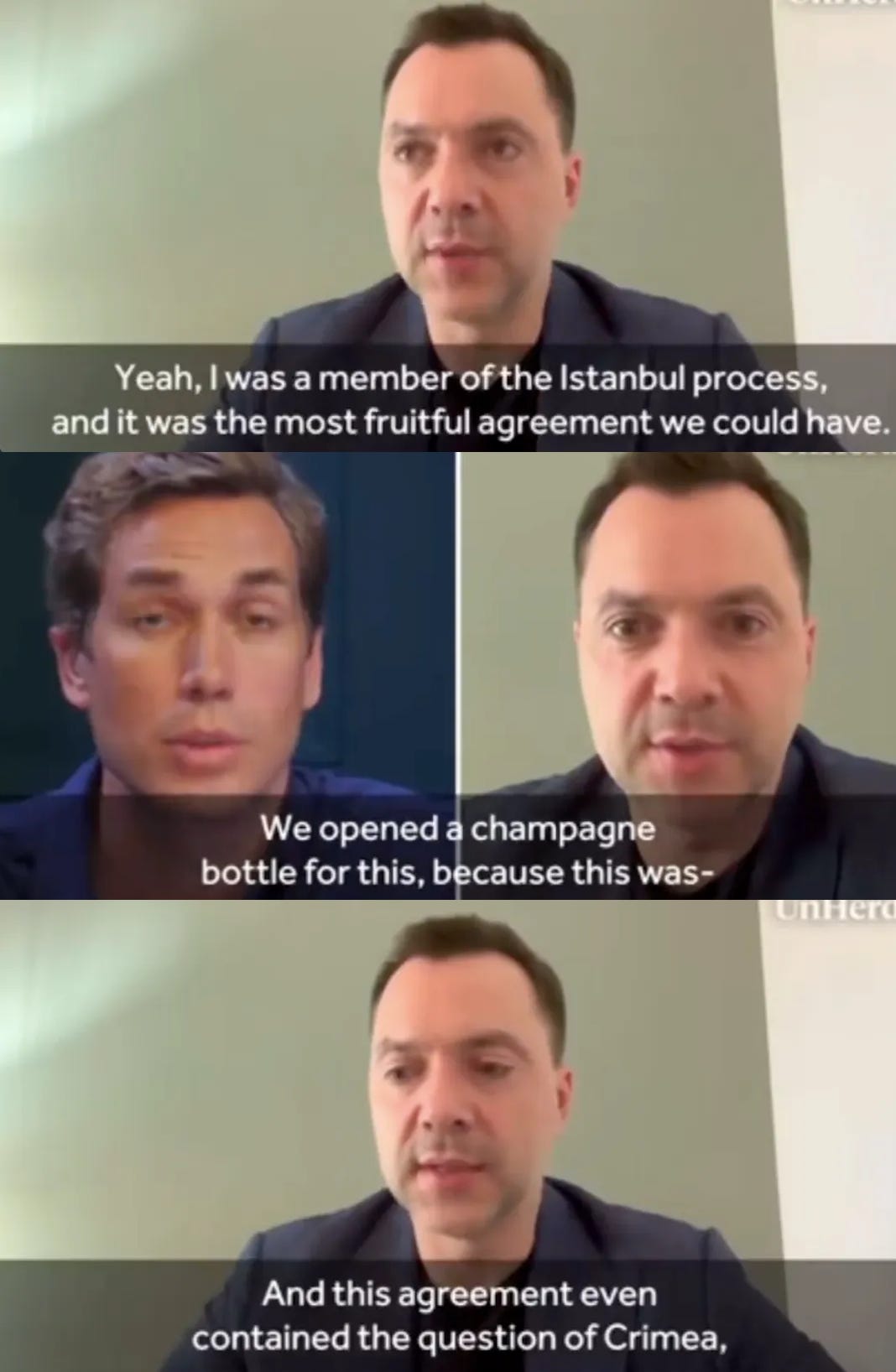
(There is an actual conspiracy of silence among Western Z-pundits and NAFO shills when it comes to the Istanbul agreement, because it makes Moscow and Kiev look bad. We’ll talk about it more later. Not right now, though.)
The good news is that Kremlin spokesman and truth connoisseur Dmitry Peskov fact-checked Lukashenko’s slanderous claim about Moscow offering to lease Crimea. Verdict: FAKE NEWS.
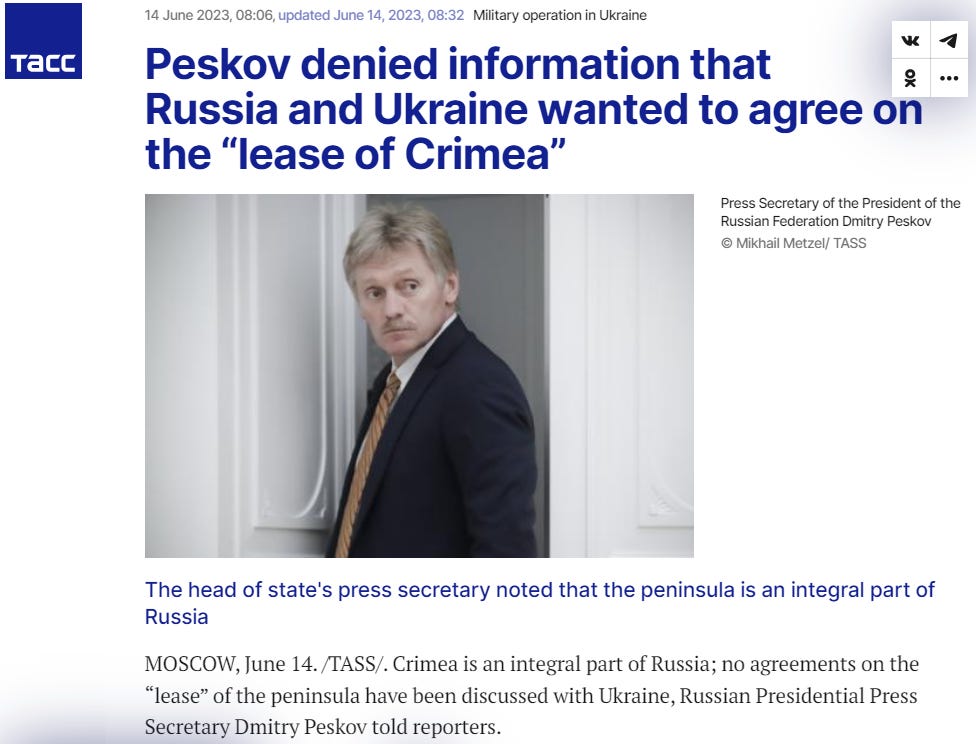
It’s very disappointing that Moscow’s closest ally would say such fake and defamatory things. Roman Abramovich could teach Luka a thing or two about what real friendship means. Real friends help you exchange Azov commanders (the guys who needed to be “denazified”) for fellow oligarchs like Viktor Medvedchuk. (Remember him? Yes, that guy.)
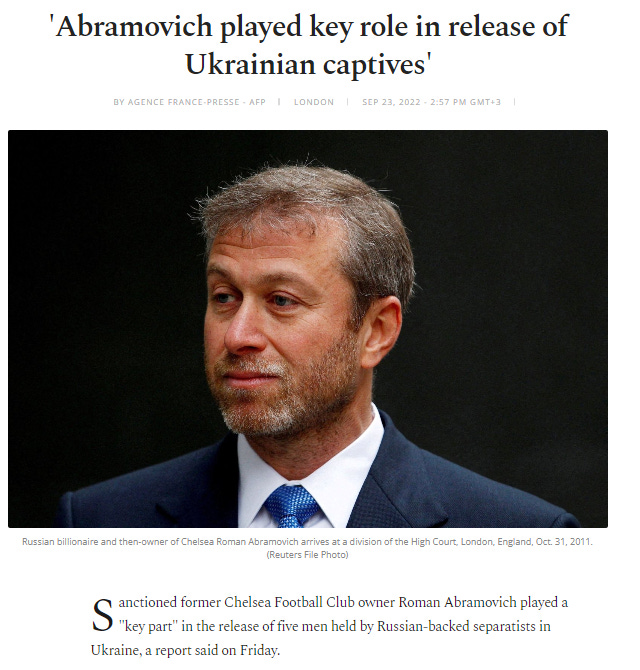
Maybe this is why Putin omitted “bringing to trial those who perpetrated numerous bloody crimes against civilians” (denazification circa 2022) when describing what denazification meant in 2024? Maybe, maybe…
One more thing while we’re on the subject. When Tucker asked what denazification would mean in practice, Putin recalled how Zelensky and Canada’s parliament gave a standing ovation to Yaroslav Hunka, who was presented as some kind of Ukrainian freedom fighter. As it turns out, Hunka fought in the SS Galicia Division during WWII. Ergo, Nazism is alive and well and needs to be stamped out.
What Putin didn’t mention is that the Canadian lawmaker who invited Hunka to parliament resigned after it was revealed that the elderly Ukrainian gentleman was an actual Nazi. The Canadian government also did a fair amount of apologizing and groveling. Obviously no one involved was actually sorry—but if it represented a red line for Putin, Moscow could always, I don’t know, suspend diplomatic relations with Canada? There are many options here.
I’m not excusing the Hunka clap-a-thon—it was peak cynicism. And that’s putting it mildly. But are we really supposed to believe that the SMO is being fought so that we can live in a world where Canadian lawmakers don’t make complete asses of themselves, resulting in their resignation?
And if Putin thinks Zelensky is a massive Nazi, why not just kill him? Oh right I forgot—Putin promised Tel Aviv that he wouldn’t do that. How silly of me to forget that.
Is Kiev a breeding ground for Nazism or is it Gazprom’s pipeline partner? Maybe it’s both? If so, maybe a necessary first step towards denazifying Ukraine is to stop paying Nazis to transport your gas to Europe, which arms and funds the aforementioned Nazis? Makes sense to me but I’m just a lowly blogger.
As for “demilitarization”: Ukraine has experienced unprecedented militarization over the past two years. It has never been more militarized. It is more militarized now than it has ever been. I don’t know why some people try to pretend otherwise, but they do, and it’s very odd.
Which brings us to arguably the most important long-term strategic goal of the SMO: Preventing Ukraine from becoming “a hostile anti-Russia”.
The relevant quote from Putin in February 2022: “The problem is that in territories adjacent to Russia, which I have to note is our historical land, a hostile ‘anti-Russia’ is taking shape. Fully controlled from the outside, it is doing everything to attract NATO armed forces and obtain cutting-edge weapons. For the United States and its allies, it is a policy of containing Russia, with obvious geopolitical dividends. For our country, it is a matter of life and death, a matter of our historical future as a nation.”
Look, I know you want to ask me about whether or not the SMO has stopped the formation of a hostile anti-Russia in Ukraine, but is this a talk show or a serious conversation? If you don’t mind, I will take only 30 seconds or one minute to give you a short reference to history to provide a little historical background.
In 882, Rurik’s successor, Prince Oleg (who was actually playing the role of regent to Rurik’s young son, because Rurik had died by that time), came to Kiev. He ousted two brothers who apparently had once been members of Rurik’s inner circle. Russia began to develop with two centers of power, Kiev and Novgorod.
In the Middle Ages, Prince Jaroslav the Wise introduced the order of succession to the throne. But after he passed away, it became complicated for various reasons. The throne was passed not directly from father to eldest son, but from the prince who had passed away to his brother, then to his sons in different lines. All this led to fragmentation.
Then in 1654, the Pan-Russian Assembly of senior clergy and landowners headed by the Tsar, which was the representative body of the power of the old Russian state, decided to include this part of the old Russian lands into Moscow’s realm. As expected, the war with Poland began. It lasted 13 years, and then in 1654, a truce was concluded.
Do you understand now? Yes, what I’m trying to say is that I’d rather not talk about anything relevant to the long-term outlook for Russia-Ukraine relations. Can we talk about something else? Let’s talk about how tricky the West is. I like talking about that.
Putin in February 2022: “The ‘empire of lies,’ which I mentioned in the beginning of my speech, proceeds in its policy primarily from rough, direct force. This is when our saying on being ‘all brawn and no brains’ applies … they have deceived us, or, to put it simply, they have played us. Sure, one often hears that politics is a dirty business. It could be, but it shouldn’t be as dirty as it is now, not to such an extent. This type of con-artist behavior is contrary not only to the principles of international relations but also and above all to the generally accepted norms of morality and ethics. Where is justice and truth here? Just lies and hypocrisy all around.” (SMO goal: To demonstrate that Moscow will no longer tolerate Washington’s “empire of lies”)
How did that work out?
As Putin revealed to Tucker, Moscow decided to use some “rough, direct force” of its own, reached the gates of Kiev, and then was tricked again. And now the West is stonewalling negotiations. Again. Remember that chain of events I mentioned earlier? It’s a nasty cycle.
Now I will quickly paraphrase this blog post.
EDWARD SLAVSQUAT’S VERY SIMPLE GUIDE TO UNPACKING THE TUCKER-PUTIN INTERVIEW:
Block out the noise—the gushing tweets, the hot YouTube takes, the RT op-eds that are republished by “alt media”—and ask yourself this: If Tucker came to Moscow so that Putin could explain in his own words why the SMO was necessary and what it had accomplished in two years, what have we learned?
What are Russia’s goals in Ukraine, and have they been achieved? How does Russia intend to “stop the war”—as Putin told Tucker? And when the dust settles, will the benefits of the SMO outweigh the blood and treasure expended to execute it? Has the SMO corrected the problems that existed pre-February 2022? These seem like highly pertinent questions.
But before we can answer these extremely relevant questions, it’s important to keep in mind that the fragmented Russian state became easy prey to the empire created earlier by Genghis Khan. His successors, namely Batu Khan, plundered and ruined nearly all the cities…

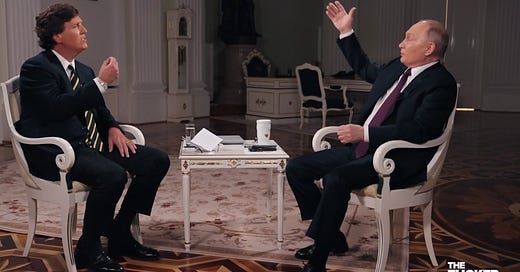



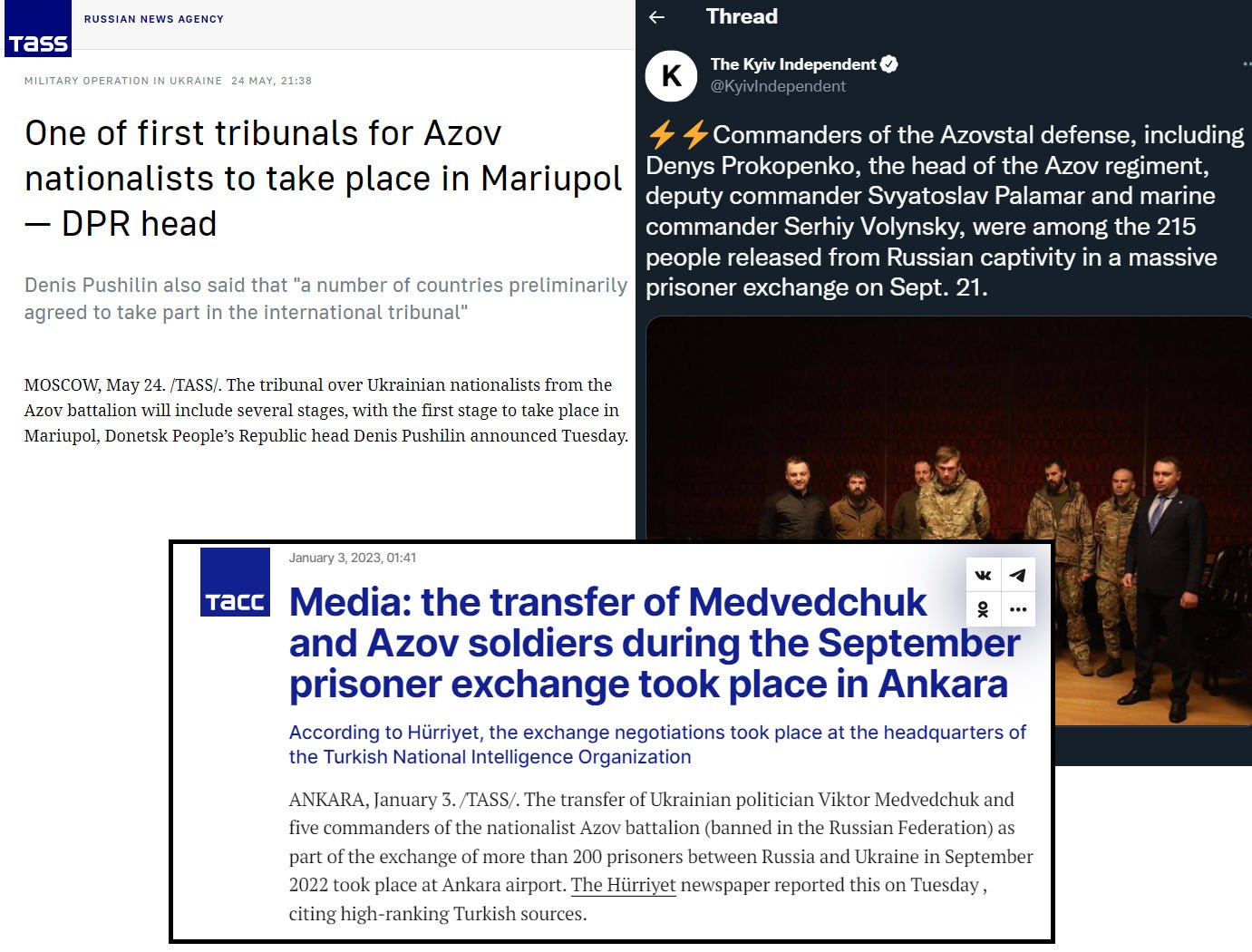
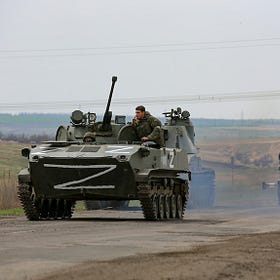
Here's how this all seems to me.
Say, you're on the road and when you see a shopping mall, your wife says hey, let's make a quick stop there and eat something and have coffee. So that's goal #1, number 2 is that you have to go to the bathroom (no pun intended). Five hours later, you're all back in the car with 3 huge bags of things you've bought and a chair. You're tired, it's dark already and when asked, you have not achieved your goal because you also wanted to check the tire pressure which you didn't do (plus you have to go to the bathroom again).
You gotta wonder why Ukraine is shelling and Russia can't stop them with a super duper high tech hypersonic missile or something. They got satellites etc to spy on them yet they can't stop it or retaliate?
5d chess is fucking dumb. 3 real dimensions and 2 dimensions of bullshit.